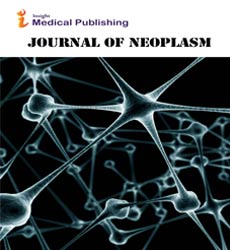Treatment Allocation and Survival in Stage I-III Pancreatic Cancer
Brian Davis
Department of Oncology, Peking University, Beijing, China
Published Date: 2024-06-15DOI10.36648/2576-3903.9.2.69
Brian Davis*
Department of Oncology, Peking University, Beijing, China
- *Corresponding Author:
- Brian Davis
Department of Oncology, Peking University, Beijing,
China,
E-mail: Davis_B@gmail.com
Received date: May 15, 2024, Manuscript No. IPJN-24-19392; Editor assigned date: May 18, 2024, PreQC No. IPJN-24-19392 (PQ); Reviewed date: June 01, 2024, QC No. IPJN-24-19392; Revised date: June 08, 2024, Manuscript No. IPJN-24-19392 (R); Published date: June 15, 2024, DOI: 10.36648/2576-3903.9.2.69
Citation: Davis B (2024) Treatment Allocation and Survival in Stage I-III Pancreatic Cancer. J Neoplasm Vol.9 No.2: 69.
Description
Orientation are modulators of wellbeing and illness and may affect therapy portion and endurance in patients with malignant growth. In this review, we examined the effect of sex and orientation on therapy assignment and in general endurance in patients with stage I-III pancreatic malignant growth. Among 5000 patients, 51.2% were female. Multivariable strategic relapse examinations with change for known confounders (age, execution status, comorbidities, growth area, cancer stage and past malignancies) showed that females less frequently gotten foundational chemotherapy contrasted with guys. Pancreatic disease is the seventh driving reason for malignant growth related demise with an expected passings all around the world. Males are more likely than females to experience the condition, which is increasing by about 1% annually.
Growth of malignants
The huge effect that orientation have on wellbeing and the course of sickness of non-related tumors has been progressively perceived. Dimorphisms may have a significant impact on the risk, treatment response and outcome of non-related cancers on multiple levels, including genetic, epigenetic, immune-, hormonal and metabolic mechanisms and effects at the cellular and systemic level, according to a growing body of research. A new commission in The Lancet examined the different degrees of connection among orientation and malignant growth. A few different examinations detailed that females will generally have better reaction rates and longer endurance while going through enemy of malignant growth treatments. This cross country investigation discovered that female patients with stage I-III pancreatic disease essentially on rare occasions got foundational treatment and had more terrible by and large endurance when contrasted with guys. Recognizing and eliminating potential barriers or biases in treatment decision-making can reduce disparities in pancreatic cancer care. Concentrates on which methodically dissect the effect of orientation on therapy portion and endurance in patients with restricted and privately progressed (stage I-III) pancreatic malignant growth are at present lacking.
I-III Pancreatic disease
The point of the current review is to look at the effect of the patients' and other patient and growth qualities on therapy distribution and generally endurance among female and male patients with stage I-III pancreatic disease in a cross country companion. The speculation that orientation affect treatment portion and endurance. NCR information comprised of patient. As a result, whenever possible, we refer to the study participants using the terms male/female in accordance with what was measured in this study and taking into account the fact that there is no information on the gender of the patients who were included. Subgroup examinations were acted in patients who got disease coordinated treatment (medical procedure, foundational treatment) and who got BSC. Awareness investigation was performed with connected NCRPACAP information. This remedy includes changing the importance edge by isolating it by the quantity of gatherings tried in (for example generally and four age gatherings). Thusly, two-sided p-values underneath 0.01 were thought of as genuinely huge. This first cross country multicenter partner concentrate on explored the effect of sex and orientation on therapy designation and endurance in 5000 patients with stage I-III pancreatic malignant growth. By and large, females less much of the time got foundational treatment contrasted with guys. The older age group is particularly responsible for differences. Strikingly, almost 50% of the patients in this accomplice got BSC. The primary justification for getting BSC over remedial plan treatment showed restraint related for guys and decision related for females. Interestingly, although not statistically significant, females in the BSC group had a better overall survival rate. The hypothesis that the patients' and possibly their gender, has a multidirectional effect on treatment allocation and survival in stage I-III pancreatic cancer patients is supported by these findings.

Open Access Journals
- Aquaculture & Veterinary Science
- Chemistry & Chemical Sciences
- Clinical Sciences
- Engineering
- General Science
- Genetics & Molecular Biology
- Health Care & Nursing
- Immunology & Microbiology
- Materials Science
- Mathematics & Physics
- Medical Sciences
- Neurology & Psychiatry
- Oncology & Cancer Science
- Pharmaceutical Sciences
